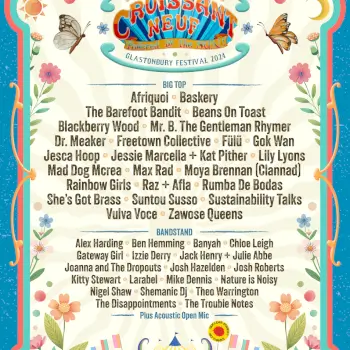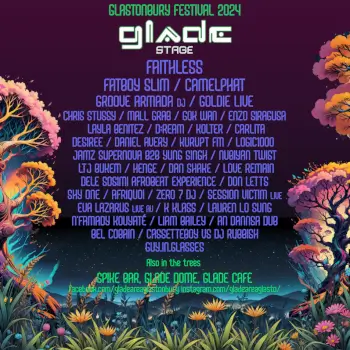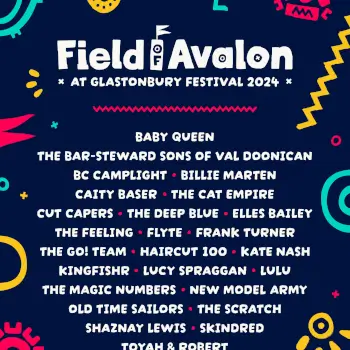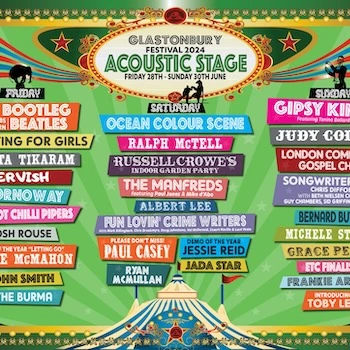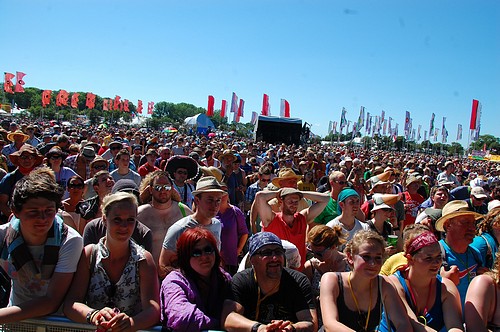
There's a recent economic study by a parcel delivery company (and we aren't sure why they're the ones who would know), and which The Guardian reports (here) that suggests that more than 1 in 10 festivals will fold this year amid ever-increasing security and infrastructure costs and tough competition for ticket sales.
This apocalyptic scenario for the festival industry is something that eFestivals believes is very unlikely to happen, yes many festivals run on precarious finances where if they don't get enough ticket sales than they're unlikely to continue, but it's unlikely that 100 of this year’s festivals will not reappear in 2017, something the delivery group's report suggests is likely.
This figure is double any previous figures in recent history. eFestivals would anticipate at worst the number of cancellations would be half that number. The most ever cancelled previously (recorded in 2012) was 57. By far the highest percent of cancellations, this happened when the festival 'bubble' burst in 2007/8 (the year incidentally that Glastonbury Festival struggled to sell tickets). It was at this time that the festival market first went past saturation point, and cancellations were in proportional terms higher than any year since.
This year, so far, we have seen 23 festivals cancelled in 2016 of the 930 we have listed, that's around 2.47% of events, a long way from 10%. That compares with previous years as follows:
% of festival listings cancelled on eFestivals by year.
number cancelled in 2015: 47 of 1070 = 4.39%
number cancelled in 2014: 35 of 1010 = 3.46%
number cancelled in 2013: 36 of 960 = 3.75%
number cancelled in 2012: 57 of 929 = 6.13%
number cancelled in 2011: 40 of 934 = 4.28%
number cancelled in 2010: 36 of 801 = 4.49%
number cancelled in 2009: 41 of 710 = 5.77%
number cancelled in 2008: 43 of 633 = 6.79%
number cancelled in 2007: 31 of 496 = 6.25%
eFestivals data would suggest that since 2013 the UK has hosted around 1,000 festivals and outdoor music events a year, the delivery company report agrees and estimates 1,000 festivals too, although they include literary, beer and food, something eFestivals as a music festivals website doesn't include. Whilst the figure is currently 930 for this year, we expect the figure to cross the 1,000 threshold as 'winter' events are added.
They also suggest this is six times as many as 12 years ago, we would disagree and would say the music festival numbers have only doubled over that period. The festival industry in the UK saw a massive growth from 2000 to 2011. Since then for the last 5 years there's been around 1,000 festivals a year, indoor and outdoor events which are mainly live music big and small. Although there has been a significant rise in 'winter' out of summer festivals since 2011. We don't include literary, beer and food only events, but their popularity has increased significantly more over the same period - which perhaps is where the x6 figure the report publishes comes from.
eFestivals has for some years now reported that the number of music festivals each year has remained fairly constant, at saturation point, with the number of new events replacing those falling by the wayside being fairly equal in number. There's also a number of new events that fail to get off the ground. We also believe it's a set trend that a festival's survival depends on meeting the demands of what people want from a festival, and that if a lot of festival goers are put off by bad organisation it's very hard to keep the event alive.
The report suggests that new and emerging events are most at risk and that's true, as often they fall foul of the trend described above. After a first year if there are teething troubles and organisational problems which affect the audiences experience of an event then it's very likely that they may not return.
However the parcel delivery people also suggest that a poor summer will put events to the sword. That's just not true. In the worst year for cancellations (2012) no festivals were cancelled that year due to weather issues although it could be considered a 'muddy' year. It's true there were some, like Glade festival went ahead that year but then failed to return after their 'wet' event.
But many more have over the years survived a drenching. This is evidenced by events such as this year's sold out Beautiful Days which has previously been hit by bad weather over the festival weekend. Last weekend's Download festival is another case in point where despite the heavy downpours loyal fans enjoyed the experience, and Bestival, Isle Of Wight, and of course Glastonbury Festival has had some well documented 'muddy years' in the past and still bounced back in the following years. Proving good customer loyalty and the way the organisers deal with extreme conditions can leave a festival untroubled by a 'wet one'. For some festival goers experiencing the elements is all part of the being outdoors experience, and can be a bonding experience amongst audiences - a 'we survived moment'.
Yes, for festivals it's crucial that they need to know that they will have a big enough audience to bring in enough money to meet the infrastructure costs. This is why if predicted ticket sales fail to meet targets a festival will pull the plug even if it's only days before an event. That's nothing new, although there's good news today that overall the number of people attending festivals each year is on the rise. A separate economic study, published today, by UK Music (here) called Wish You Were Here 2016 reveals that 3.7 million people attended a UK festival in 2015 in the UK, that's up from the 3.5 million they reported the year before.
eFestivals' own figures also suggest that the maximum total number of tickets available each year has been static for the last few years at around the 6-6.5 million mark. That would suggest that there are just under 2 million festival tickets on sale annually that rely on festival goers making more than one visit to a festival each year. That would therefore suggest a third of the market relies on providing a festival experience or line-up to their customers at least as appealing as one elsewhere.
It's also true to say that some events in the past have relied on Glastonbury Festival having a fallow year, a year where the event doesn't run, and in these year's the festival audience tend to look at other events to get their annual dose of festivalling. However there is no break on the horizon, and the next year off will see organisers try something else somewhere else. It is a factor which could impact on the rest of the market, but still unlikely to bring about the collapse of a tenth of the market!
The report doesn't mention this, but it does state that how many ticket sales festival organisers make is pretty dependent on the quality of the acts they have. However, again, this isn't always true there have been occasions where this has not been the case, strong line-ups have at various events over the years failed to attract festival goers in numbers.
Conversely, there's still a fair few events such as this year's Beautiful Days, SW4, Shambala, Belladrum Tartan Heart, Wildfire Adventure Camp!, and of course Glastonbury Festival that have all had decent ticket sales before they revealed their line-ups in full.
The delivery service report also contains a few wild inaccuracies, the most glaring of which is the 'reporting' (including The Guardian the Festival's own media partner- and should know better) of the profit figures made by Glastonbury Festival in 2014. Publishing that despite having a turnover at £37m total profits were a mere £86,000 - wholly failing to disclose to readers that Glastonbury Festival's main mission is to raise as much money as possible for it's supported charities. Instead the report gives the false impression the Festival is struggling with finances. There are no other events in the world that donate so much of their income to good causes.
The report also suggest that the average ticket price for festivals around the UK is £200, we think that's rather more than our own listings would suggest. We would peg the average price at around £100. This figure includes that fact that there's nearly always early bird offers which are very reasonable, in many cases the price of early bird have not risen in price for the last few years, contrary to reports that festival prices are being hiked year on year. Early bird ticket sales also go along way to predicting how well an event will fare and many such as WOMAD, sold out of early birds faster this year then any previous year.
eFestivals also lists many well run events where live music and camping in a field is available for under £50 for the weekend, as well as a handful of free events (although these have decreased in number in recent years). Small events tend to be cheaper than the big major events where production and infrastructure costs are so much higher, and it's not beyond the realm of possibility that a big name event could find itself the wrong side of the profit margin in the future, and find itself in trouble.
It's nothing new that UK festivals can suffer in a costly and crowded field, they have done for many years now if they don't get it right. The landscape of festivals has been changing over the years, with new events rising in popularity and some of the more established events waning, and eFestivals has tried it's best to map that festival landscape as it alters. To see what the festival landscape looks like out there this year, please take a look at our Festival Search Page.
Latest Updates
 Live in The Wyldes 2024
Live in The Wyldes 2024festival details
 LatinoLife In The Park 2024
LatinoLife In The Park 2024festival details
 The Great Estate 2024
The Great Estate 2024festival details
 Dot to Dot festival (Bristol) 2024
Dot to Dot festival (Bristol) 2024festival details
 Glastonbury Festival 2024
Glastonbury Festival 2024line-ups & rumours

